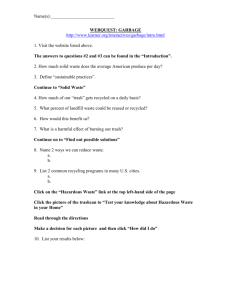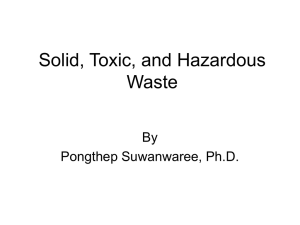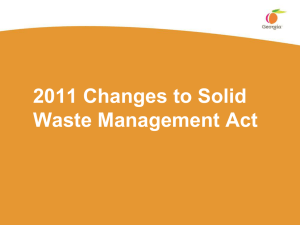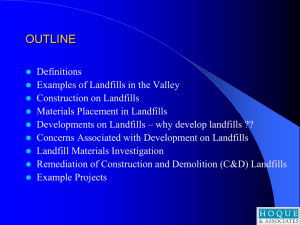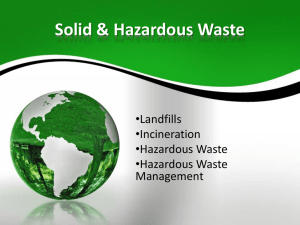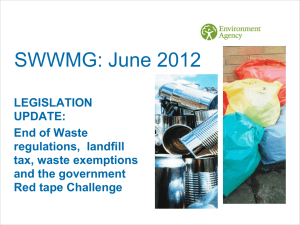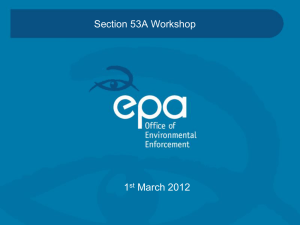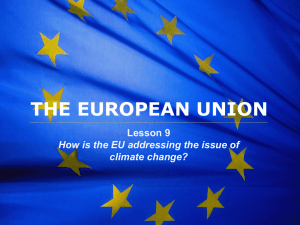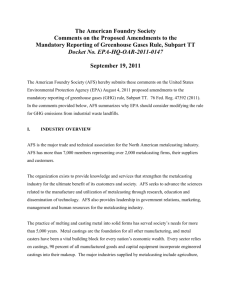- New Zealand climate change information
advertisement
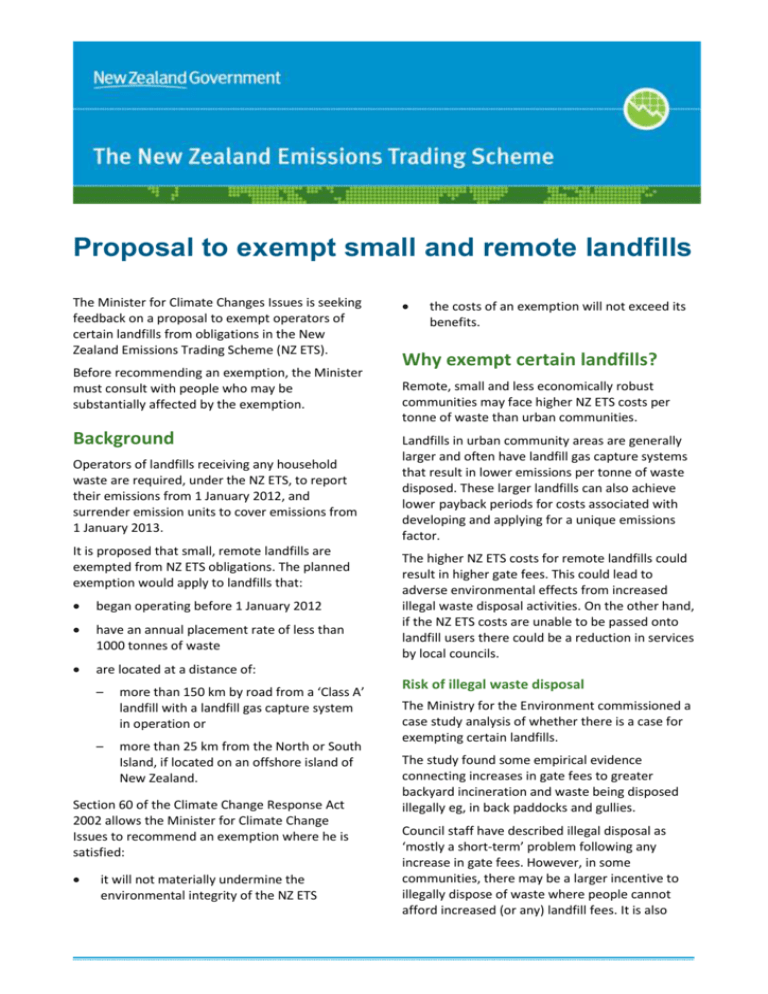
Proposal to exempt small and remote landfills The Minister for Climate Changes Issues is seeking feedback on a proposal to exempt operators of certain landfills from obligations in the New Zealand Emissions Trading Scheme (NZ ETS). Before recommending an exemption, the Minister must consult with people who may be substantially affected by the exemption. Background Operators of landfills receiving any household waste are required, under the NZ ETS, to report their emissions from 1 January 2012, and surrender emission units to cover emissions from 1 January 2013. It is proposed that small, remote landfills are exempted from NZ ETS obligations. The planned exemption would apply to landfills that: began operating before 1 January 2012 have an annual placement rate of less than 1000 tonnes of waste are located at a distance of: – – more than 150 km by road from a ‘Class A’ landfill with a landfill gas capture system in operation or more than 25 km from the North or South Island, if located on an offshore island of New Zealand. Section 60 of the Climate Change Response Act 2002 allows the Minister for Climate Change Issues to recommend an exemption where he is satisfied: it will not materially undermine the environmental integrity of the NZ ETS the costs of an exemption will not exceed its benefits. Why exempt certain landfills? Remote, small and less economically robust communities may face higher NZ ETS costs per tonne of waste than urban communities. Landfills in urban community areas are generally larger and often have landfill gas capture systems that result in lower emissions per tonne of waste disposed. These larger landfills can also achieve lower payback periods for costs associated with developing and applying for a unique emissions factor. The higher NZ ETS costs for remote landfills could result in higher gate fees. This could lead to adverse environmental effects from increased illegal waste disposal activities. On the other hand, if the NZ ETS costs are unable to be passed onto landfill users there could be a reduction in services by local councils. Risk of illegal waste disposal The Ministry for the Environment commissioned a case study analysis of whether there is a case for exempting certain landfills. The study found some empirical evidence connecting increases in gate fees to greater backyard incineration and waste being disposed illegally eg, in back paddocks and gullies. Council staff have described illegal disposal as ‘mostly a short-term’ problem following any increase in gate fees. However, in some communities, there may be a larger incentive to illegally dispose of waste where people cannot afford increased (or any) landfill fees. It is also likely there are greater opportunities for illegal disposal in small and isolated communities. Illegal waste disposal leads to negative environmental outcomes including soil, water and air pollution. It creates costs for councils to police disposal activities and to remove illegally-disposed waste. Some councils may already be under resource stress through partially or wholly absorbing NZ ETS and other waste disposal costs. Risk of reduced council services Interviews with council staff as part of the study have provided evidence the NZ ETS will not affect waste minimisation budgets or activities. In fact, increasing the costs for disposing waste is expected to increase community waste minimisation activities and raise awareness. However, there is a concern that some councils will choose to absorb the increased landfill operating cost out of existing budgets by adjusting service levels, or recover the costs from ratepayers. Such an approach is more likely for small and remote landfills. Also, in these situations no price incentive would be felt by landfill users, so there would be no incentive to divert waste for other uses like composting. There would be negative impacts on council services and the economic situation of ratepayers. Proposed exemption criteria 1. Operation prior to 1 January 2012 This avoids any incentive to open new landfills to take advantage of an exemption. 2. Annual placement rate of less than 1000 tonnes This limits the availability of exemptions to smaller landfills. It is not economically viable for smaller landfills to put landfill gas capture and destruction systems in place. The threshold of 1000 tonnes aligns with the waste levy reporting threshold for smaller landfills. 3. Distance to nearest ‘Class A’ landfill of over 150 km (or distance of over 25 km from North or South Island for offshore landfills) This limits the scope of exemption to remote landfills. Many communities have waste disposal options that include transporting waste to larger, more modern landfills equipped to abate their emissions. However, some communities are simply too far away from other landfills for this to be viable. Consideration of socio-economic deprivation The study suggested one other possible exemption criterion based on the level of socioeconomic deprivation in the communities being serviced by a landfill. This would limit the availability of exemptions to communities whose ratepayers would struggle to fund the cost of NZ ETS obligations. However, many landfills dispose of waste that has been collected from large catchments which typically do not coincide with consistent deprivation index ratings. As such, the socioeconomic deprivation criterion suggested by the study is considered to add complexity and lack transparency and therefore is not proposed as a criterion for exemption. Who pays for exempt emissions? Emissions that are exempt from the NZ ETS still have to be accounted and paid for by New Zealand due to our international obligation under the Kyoto Protocol. The cost of those emissions would be absorbed by the Government. However, there are also likely to be administrative savings associated with landfill operators that would no longer be participating in the NZ ETS. Tell us what you think We welcome submissions from all interested parties and on all aspects of the proposal. The consultation questions below are intended as a guide only. All submissions need to be received by: 5pm Tuesday 12 June 2012. Please email to climatechange@mfe.govt.nz or mail to Ministry for the Environment, PO Box 10362, Wellington 6143. Consultation questions 1. Do you think that exempting landfills that service remote, less economically robust communities is warranted? 2. What do you think would be the likely impacts of granting or not granting an exemption (including costs and benefits)? 3. What is your assessment of the risk of adverse environmental effects outlined? 4. Are there alternatives to providing an exemption? 5. Do you consider the exemption criteria proposed are appropriate and fit for purpose? Useful links SKM Report “ETS Operational Policy – Landfill Exemptions” Available at http://www.climatechange.govt.nz/consultation/ waste-landfills Information on Class A requirements http://www.mfe.govt.nz/publications/waste/hazwaste-guide-module-2-may04/html Published in May 2012 by the Ministry for the Environment, PO Box 10362, Wellington 6143 INFO 645
